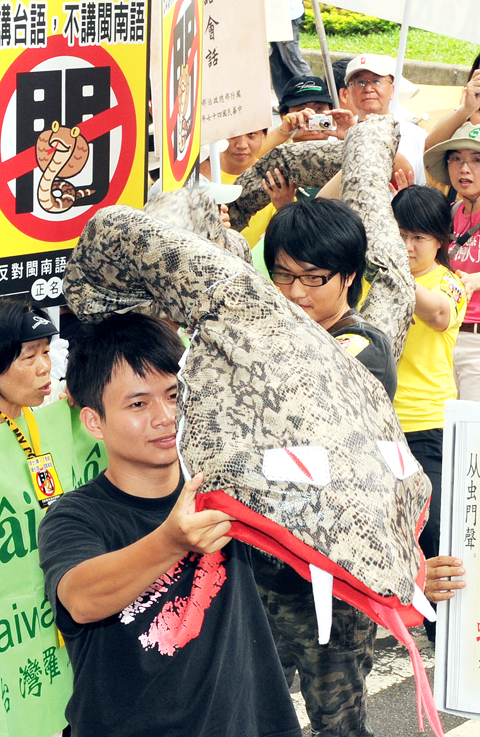Activists gathered outside the Ministry of Education yesterday to protest against the ministry referring to Hoklo (also known as Taiwanese) in curriculum guidelines as “Minnan language” (閩南語).
About 100 demonstrators attended, carrying placards that read “I live in Taiwan, I don’t speak Minnan. Don’t call me a speaker of Minnan” and a giant snake toy to represent the Chinese character “min.”
“Min” refers to China’s Fujian Province, but the protesters said the character’s original meaning was “snake.” “Minnan language” or “Minnan dialect” is used in China to refer to a family of dialects spoken mostly in Fujian.

PHOTO: LO PEI-DER, TAIPEI TIMES
Lee Wen-cheng (李文正), one of the protesters, said the ministry had violated the spirit of the UN’s Universal Declaration of Human Rights and Universal Declaration of Linguistic Rights by describing the Taiwanese people and their language as “Minnan.”
Taiffalo Chiung (蔣為文), a professor of Taiwanese literature at National Cheng Kung University, said the ministry should call Hoklo “Taiyu” (台語) in its curriculum guidelines, adding that the term was more than 100 years old.
The demonstrators threw sacks full of fake snakes over a closed gate into the ministry’s parking lot to express their dissatisfaction after Yang Chang-yu (楊昌裕), director of the Department of Elementary Education, said he did not have the authority to change the curriculum guidelines.
Yang, who met the protesters on behalf of Minister of Education Cheng Jei-cheng (鄭瑞城), said the ministry had long used the term “Minnan” in curriculum guidelines.
Yang said he would convey the protesters’ message to the minister.
In related news, the Department of Elementary Education said yesterday it would encourage junior high schools to offer English proficiency tests for incoming students to gauge their level before starting junior high.
Wu Lin-hui (吳林輝) of the department said schools could then offer summer classes to help students with low scores improve their English.

Taiwanese can file complaints with the Tourism Administration to report travel agencies if their activities caused termination of a person’s citizenship, Mainland Affairs Council Minister Chiu Chui-cheng (邱垂正) said yesterday, after a podcaster highlighted a case in which a person’s citizenship was canceled for receiving a single-use Chinese passport to enter Russia. The council is aware of incidents in which people who signed up through Chinese travel agencies for tours of Russia were told they could obtain Russian visas and fast-track border clearance, Chiu told reporters on the sidelines of an event in Taipei. However, the travel agencies actually applied

Japanese footwear brand Onitsuka Tiger today issued a public apology and said it has suspended an employee amid allegations that the staff member discriminated against a Vietnamese customer at its Taipei 101 store. Posting on the social media platform Threads yesterday, a user said that an employee at the store said that “those shoes are very expensive” when her friend, who is a migrant worker from Vietnam, asked for assistance. The employee then ignored her until she asked again, to which she replied: "We don't have a size 37." The post had amassed nearly 26,000 likes and 916 comments as of this

New measures aimed at making Taiwan more attractive to foreign professionals came into effect this month, the National Development Council said yesterday. Among the changes, international students at Taiwanese universities would be able to work in Taiwan without a work permit in the two years after they graduate, explainer materials provided by the council said. In addition, foreign nationals who graduated from one of the world’s top 200 universities within the past five years can also apply for a two-year open work permit. Previously, those graduates would have needed to apply for a work permit using point-based criteria or have a Taiwanese company

The Shilin District Prosecutors’ Office yesterday indicted two Taiwanese and issued a wanted notice for Pete Liu (劉作虎), founder of Shenzhen-based smartphone manufacturer OnePlus Technology Co (萬普拉斯科技), for allegedly contravening the Act Governing Relations Between the People of the Taiwan Area and the Mainland Area (臺灣地區與大陸地區人民關係條例) by poaching 70 engineers in Taiwan. Liu allegedly traveled to Taiwan at the end of 2014 and met with a Taiwanese man surnamed Lin (林) to discuss establishing a mobile software research and development (R&D) team in Taiwan, prosecutors said. Without approval from the government, Lin, following Liu’s instructions, recruited more than 70 software